My favourite books of 2016
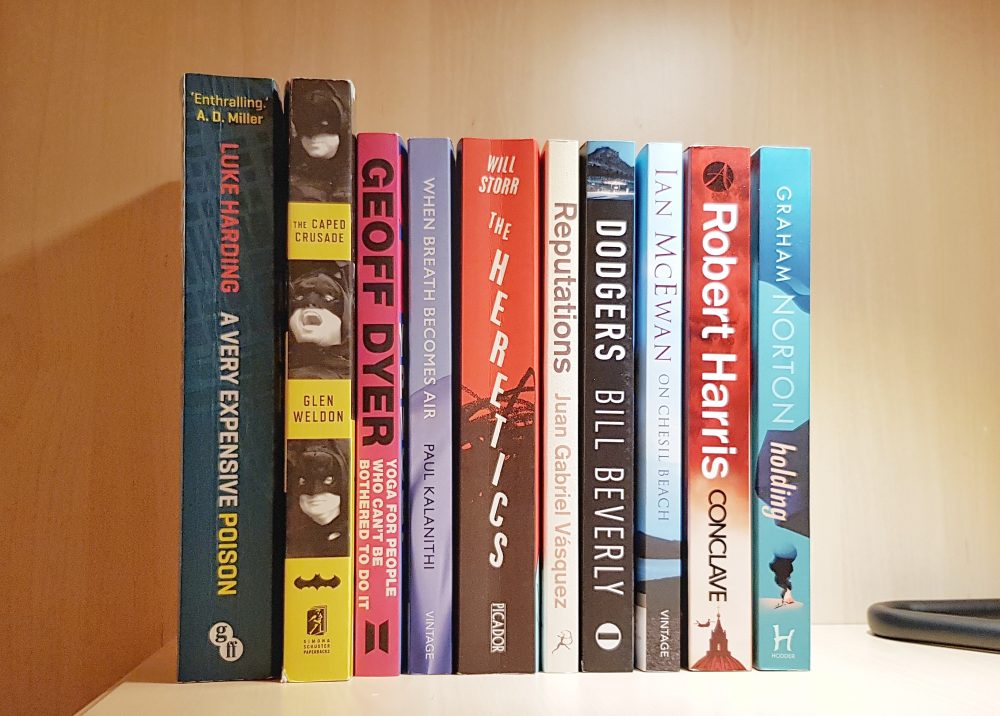
At this time of year, lots of people and publications start putting out lists of their favourite books of the year. Because I’m a bit contrarian, I thought I’d do something a bit different: share my favourite books from three years ago.
My rationale is that if a book I read three years ago has stayed with me, it surely must have been a good. And so, I logged onto my Goodreads account and downloaded a list of books I read in 2016. I manually sorted them in order of favourites as I remember them, without any reference to what I thought at the time. And in this post, I share my top few.
Because I evidently read a lot of novels in 2016, I decided to divide my list into “novels” and “not novels”, and have listed the top five in each category below. As I also tend to go through phases with particular writer, I’ve limited myself to including only the top-ranked work by any single author in each list; otherwise, the top five novels would mostly be Ian McEwan, and that doesn’t make for an interesting blog post.
So here are my thoughts on my favouite books of 2016.
My five favourite novels of 2016
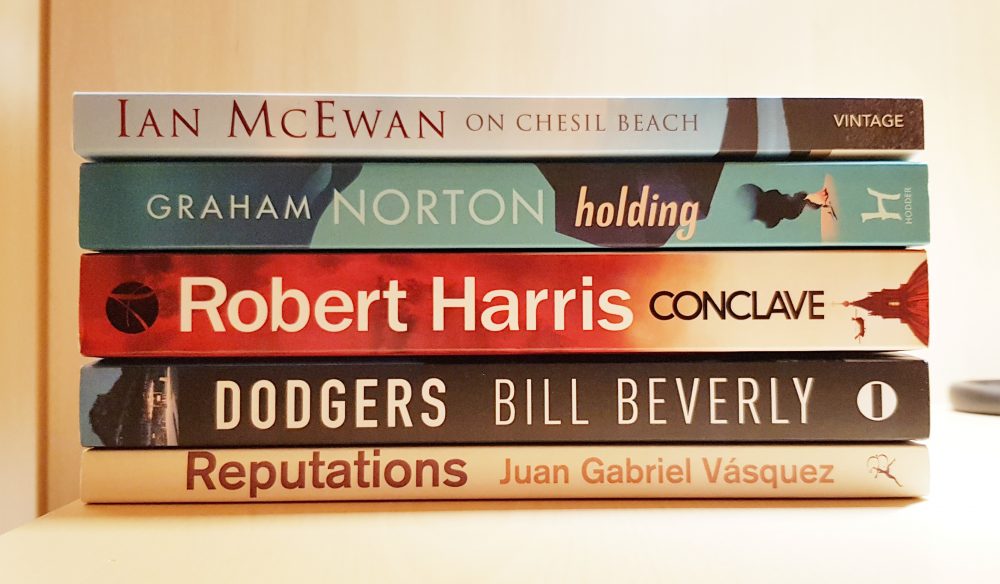
5: Dodgers by Bill Beverly
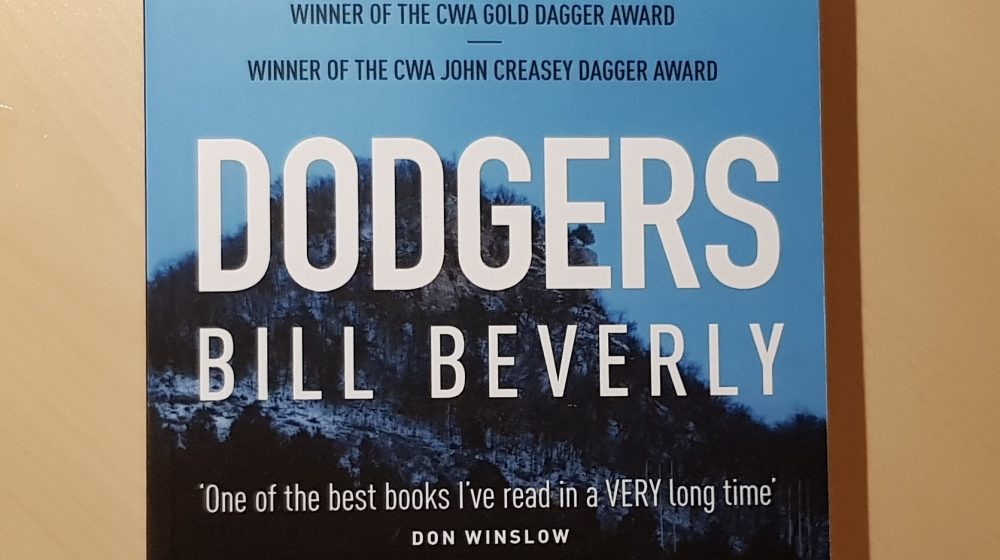
This was a coming-of-age novel about a group of black American teenagers going on a road trip across America.
Steeped in a culture and viewpoint which is unfamiliar to me, this was unlike anything I’d read before (or since). I think this book taught me to think rather differently about the challenges of up as a deprived black kid in America and about the pervasive nature of gang culture.
More generally, this book made me reflect about becoming better at understanding that people’s life decisions can be perfectly logical within their own frame of reference, even if they make little sense from my point of view. I remember the central resonant theme was really about breaking away from one’s own past and upbringing.
At the time I read this, I gave it five out of five:
“I’ve never read anything quite like this before. East is a 15-year-old boy living in a cardboard box in the basement of his drug addict mother’s house in a deprived area of LA. He runs a team of lookouts defending a drug house. After his team fails to see a drug raid coming, East—who has never left his neighbourhood—is ordered to drive across the country with his 13-year-old half-brother and two other youngsters to shoot a witness in a drug trial. Unsurprisingly, things don’t go to plan.
“So Dodgers turns out to be a deeply personal coming-of-age novel, with East at its centre, against a background of crime, deprivation and America. It’s written in the sparingly tight prose of many classic American novels, but with the detail required to make even the minor characters believable. This is a book that I’ll remember for a long time to come—and will definitely read again at some point.”
4: Conclave by Robert Harris
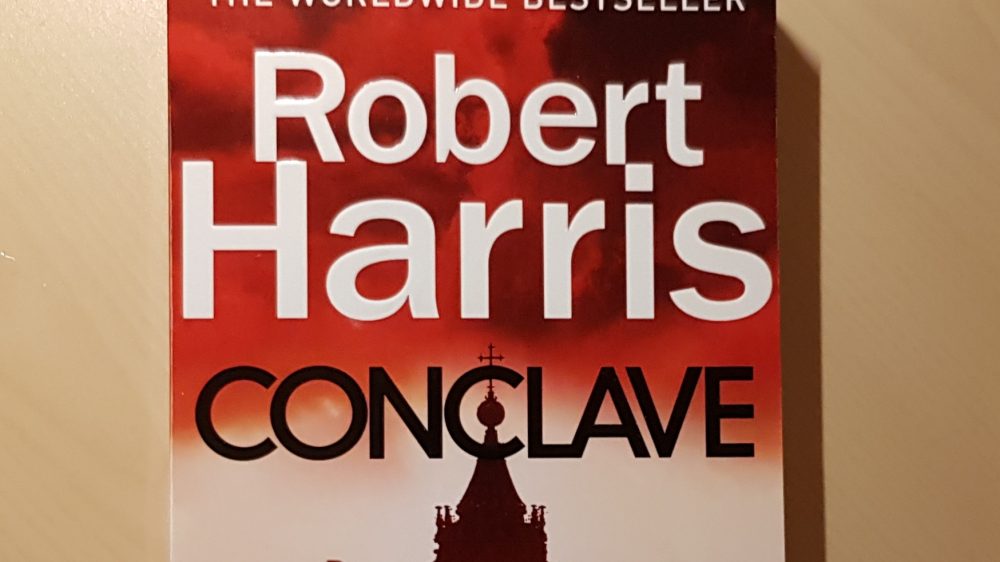
I have a slight (and possibly irrational) aversion to historical fiction, so I’ve read less of Robert Harris’s work than might be assumed.
Conclave, however, had a contemporary setting, and concerned the election of a new Pope. This book had lots of great colour about the process of entering the conclave, and wider observations of the machinations of the Vatican.
This book became a somewhat unlikely (but nonetheless brilliant) political thriller, yet the philosophical and theological questions the plot confronted made this still more intriguing, and provided plenty of food for thought.
There was also a quote from this book which I’ve thought about a lot since reading it:
No one who ever follows their conscience ever does wrong. The consequences may not turn out as we intended; it may prove that we made a mistake. But that is not the same as being wrong.
It was a really good book.
At the time I read this, I rated it four out of five:
“A political thriller set among the College of Cardinals as they elect a new Pope. This was great: a real page-turner with plenty of twists and turns, but with lots of complex layers underlying the surface plot, and a good dose of moral ambiguity. The dialogue, in particular the set piece speeches, was very well written. I’ve no idea how true to life this description of events might be, but felt like a real insight into the machinations of the Catholic Church.”
3: Holding by Graham Norton
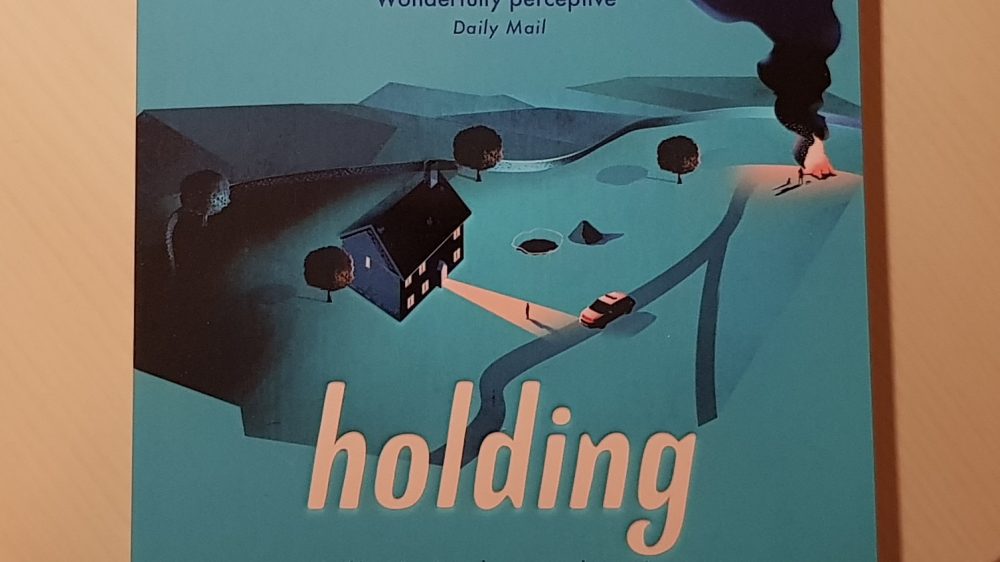
Holding was a witty, closely observed and genuinely intriguing murder mystery set in Ireland. I remember thinking that it wasn’t the sort of novel I’d associate with the chat show host, and that I could barely believe it was someone’s first novel. It was atmospheric and evocative.
In 2016, I rated this four out of five:
“A witty and engaging novel describing the aftermath of a body being found in a sleepy Irish village. I wouldn’t have guessed this was by Graham Norton if his name wasn’t on the cover, and I wouldn’t have guessed it was a first novel.
“The characters are endearing, and the plot is relatively pacey while still allowing space for carefully observed description. The resolution of the main plot is a bit disappointingly ‘crime novel by numbers’ and doesn’t fit tonally with the rest of the book, but I enjoyed reading this nonetheless.”
2: On Chesil Beach by Ian McEwan
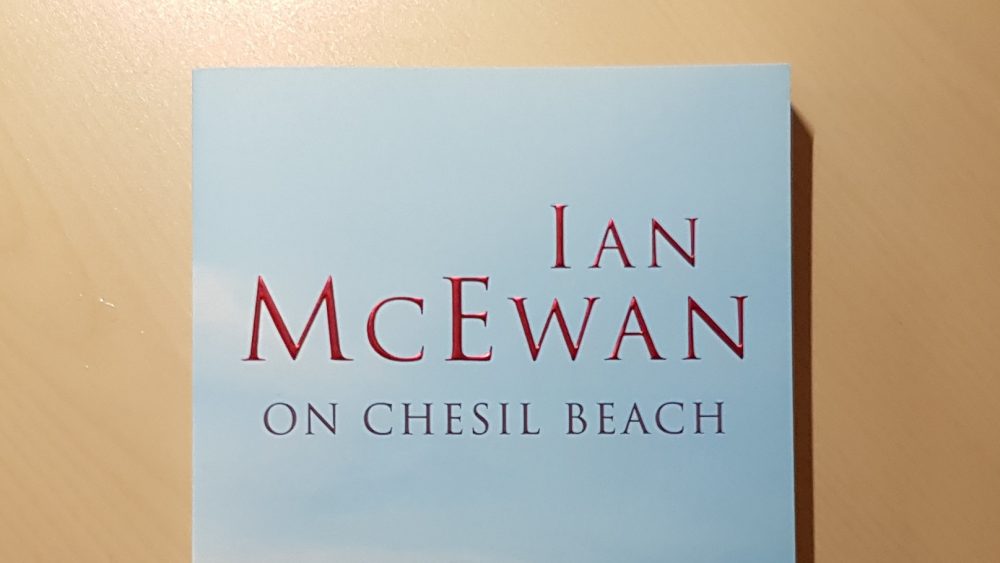
I love Ian McEwan, so it’s no surprise to see one of his novels towards the top of my list. In fact, I loved On Chesil Beach so much that I even managed to get Wendy to read some of it, and she usually hates novels.
On Chesil Beach was the story of the wedding night of a young and sexually inexperienced couple in the 1960s. The short book was set entirely in that one evening, lending it a sense of detailed immediacy.
For such a short book, this had considerable emotional heft. I found it very moving. I took a few quotes from this book that often pop up in my Readwise emails, several of which give away the ending, but this one doesn’t:
He was discovering that being in love was not a steady state, but a matter of fresh surges or waves, and he was experiencing one now.
Since I read this book, it has been adapted into a film starring Saoirse Ronan and Billy Howle. I haven’t seen it because I’m too worried that it will spoil my fond memory of the novel.
I didn’t review On Chesil Beach at the time, so I’ve nothing to compare my retrospective view with. I did give it a start rating though: five out of five.
1: Reputations by Juan Gabriel Vásquez
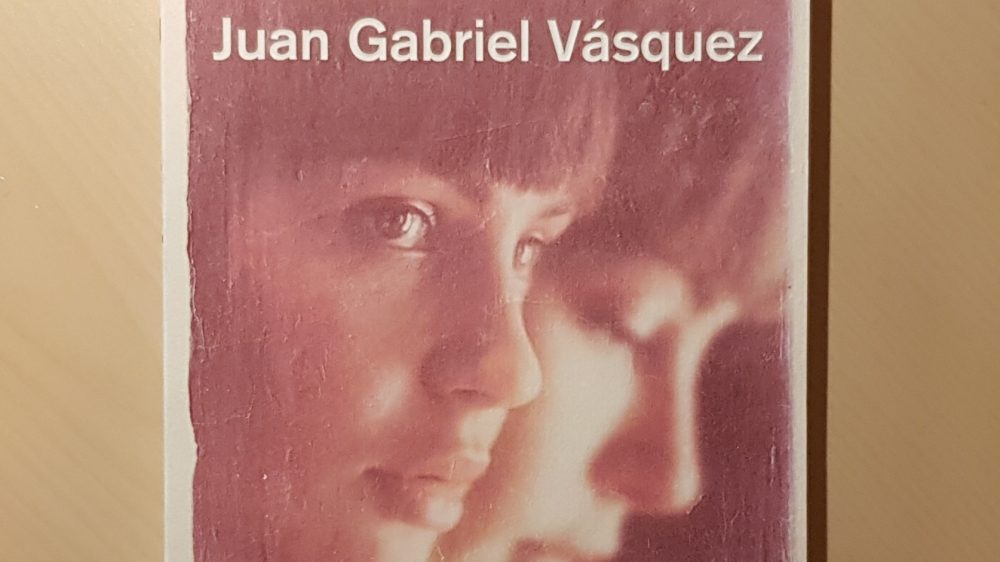
Reputations made me reflect rather a lot on the difficulty of political journalism in countries with particularly tubulent politics. This is perhaps because of the degree to which political journalism has become a challenge in the UK in the context of divisions over Brexit: many people see bias everywhere, there’s no consensus on basic facts, and impartiality has become ever more difficult to achieve.
Reputations concerned a Colombian political cartoonist reflecting on his career and his choices along the way. I remember being absorbed by the questions (often also pertinent in Ishiguro’s novels) about reliability of memory and the interaction between memory and regret.
This book was also jam-packed with great quotations, presumably thanks in large part to Anne McLean’s wonderful work as translator. Three choice examples:
Not knowing is not hell. The hellish thing is not knowing whether I want to know.
There are no political cartoons that don’t sting, and none without honey.
People already know what they think. People already have their prejudices well formed. They only want someone in authority to confirm their prejudices, even if its the mendacious authority of newspapers.
Just brilliant, and so on the money for the times we’re living through.
I am amazed to see that, when I read this, I only gave it two out of five stars—what a contrast with how I think of it in retrospect!
“This is a novella about a political cartoonist reaching the end of his career. At an event celebrating his life, he meets a young female journalist who he had previously met as a child, when an event pivotal to the novel’s plot occurred. Revisiting ‘the event’ risks the reputations of many of the novel’s characters.
“The writing is tight, and even in translation remains eminently quotable.
“But—I found the plot hard to follow, very implausible in places (seven year olds drinking themselves unconscious?!), and unresolved by the ending. With fantastic prose but so much else letting it down, I’m slightly baffled as to why this has been so critically praised.”
My five favourite non-novels of 2016
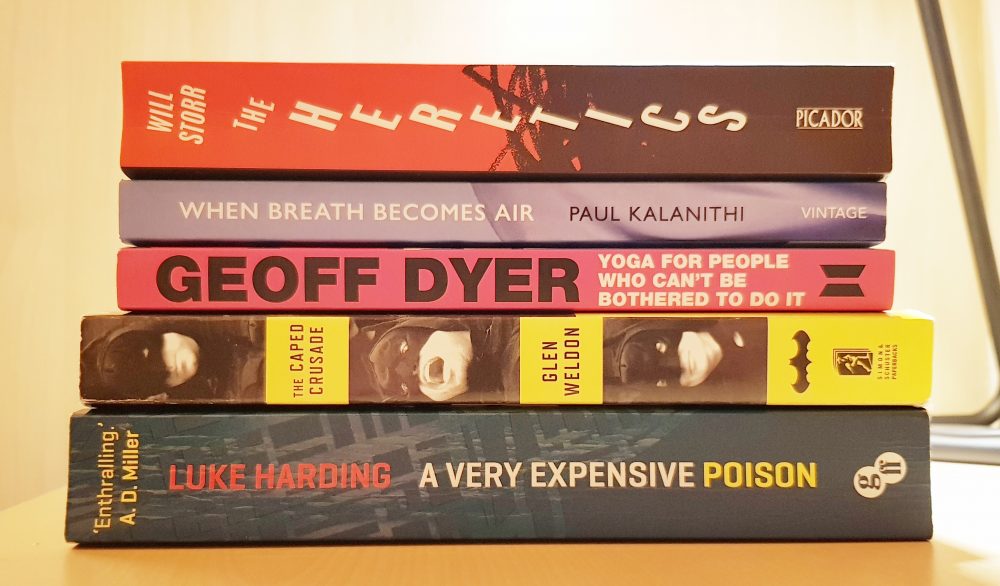
5: Yoga For People Who Can’t Be Bothered To Do It by Geoff Dyer
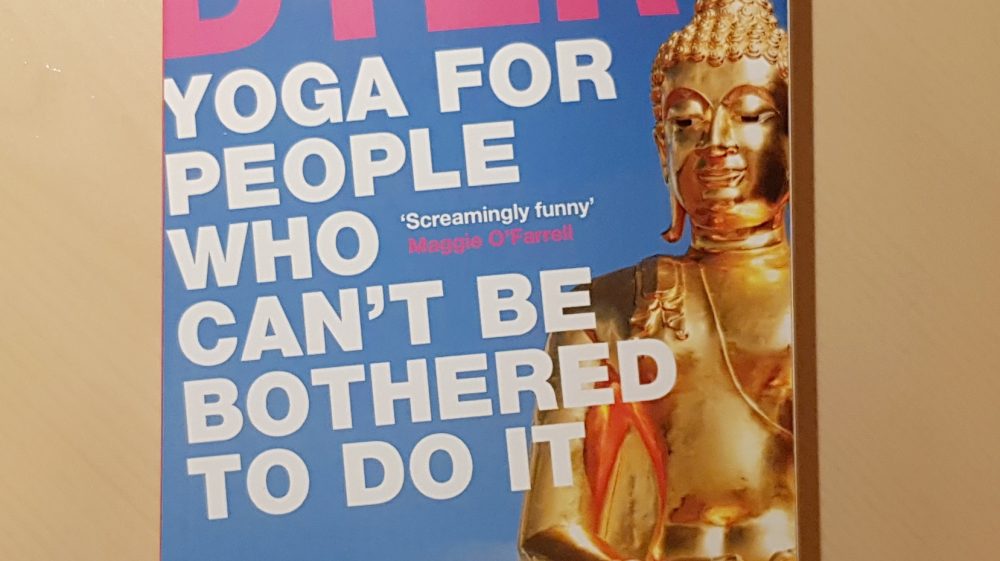
This was a fantastic romp of a book, a sort of self-discovery travelogue of things that acutally happened, “even if some of them only happened in my head”. I haven’t read anything quite like this before or since: it was absurd and deep and hilarious and philosophical and though-provoking all at the same time, often in the same sentence.
There are so many quotes from this book that I love, and which pop into my head spontaneously from time to time:
‘It’s all about moderation,’ he said in the Greenhouse on Friday night, after a deliciously inauthentic Thai meal. ‘Everything in moderation. Even moderation itself. From this it follows that you must, from time to time, have excess. And this is going to be one of those occasions.’
‘It fucked up my life but I wasn’t upset. You know, they kept talking about “undergoing” surgery, “undergoing” chemo. It really bugged me. I never saw it that way. I was just living my life. I wasn’t “undergoing” it.’
I became convinced that buildings don’t just fall into ruin – something in them aspires to ruination. It’s the same with people. The purpose of architecture – even the most baroque, especially baroque – and medicine is simply to thwart the urge to collapse. (Maybe that should read ‘disguise’, not ‘thwart’.) All we can do is keep applying the creosote, propping ourselves up with health and success, trying to keep the rain and the damp and the rot at bay for a little longer, trying to postpone the moment of complete collapse and abandonment for the same reason that one waits as long as possible for the first alcoholic drink of the day: because the longer you leave it, the better it will feel.
This was just a rollercoaster of hilarity and genius all mixed in togeher.
I gave this only four of five stars when I read it in 2016:
“Geoff Dyer staggers through an autobiography of adventures, all of which “really happened, but some of the things only happened in my head”. Essentially, Dyer has incredible experiences around the world but laces descriptions of them with profound bathos, either by pointing out their intrinsic absurdity or by drawing unflattering comparisons to humdrum daily life.
“I very much enjoyed this, and found myself laughing out loud on more than one occasion. The careful balance between earnestness and knowing humour is very well judged and really tickled me. And every now and then, there are sparklingly brilliant passages.”
4: Heretics by Will Storr
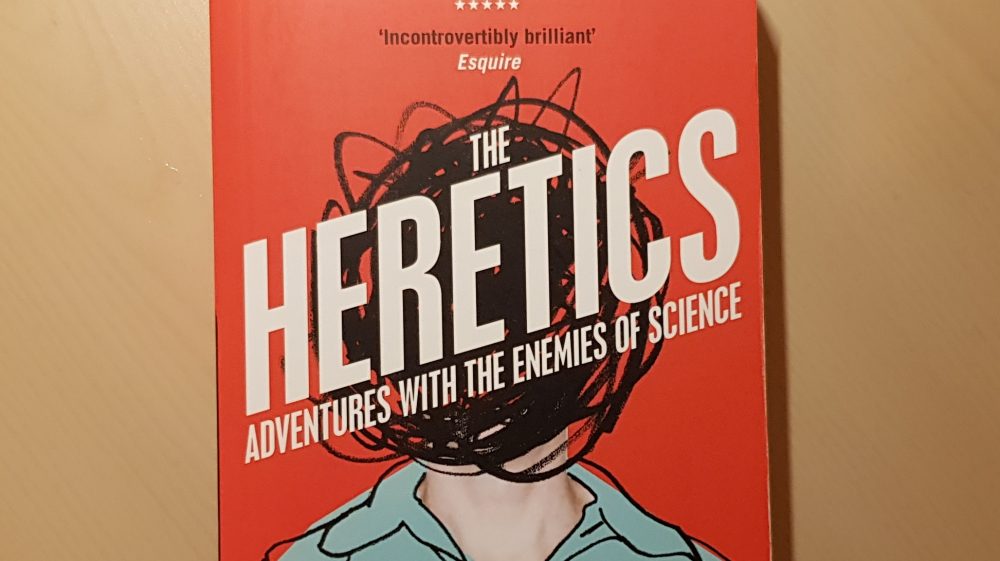
I think Will Storr is criminally under-rated, and it is no surprise that one of his books should be so high up on my list.
Heretics was Storr’s book about cognitive bias, in which he unpicks why people who hold views which run counter to conventional science continue to hold those views in spite of all the evidence. It was a sympathetic and interesting portrait, and changed my view on some of the relevant challenges in public health, such as people who oppose vaccinations.
This book taught me that it is important to understand their perspective to understand why their decisions may be rationale, even if they are completely wrong from an objective standpoint.
We tell ourselves a story, we cast the monster and then become vulnerable to our own delusional narrative of heroism. This kind of binary thinking insists upon extremes: heroes and villains, black and white, in-tribes and out. This corrosive instinct is evidence in the so-called ‘culture wars’. For many Skeptics, evidence-based truth has been sacralised. It has caused them to become irrational in their judgements of the motives of those with whom they do not agree.
This is a book that had a real impact on my public health practice, despite superficially having nothing to do with public health.
Heretics got the full five stars in 2016:
“One of my favourite books of the year so far. From the blurb, I was expecting this to be an enjoyable (if slightly sneering) debunking of pseudo-science. It’s not that. It’s a fascinating illustrated discussion of cognitive bias, backed up by astounding and revealing investigative journalism. Storr examines the claims and motives of ‘heretics’ and ‘skeptics’ alike in forensic detail – he doesn’t pull any punches in his discussion of the latter, which is refreshing and offers new insights.
“I’ve long been a fan of Will Storr’s magazine features – I will read almost anything with his byline on it, because his name is almost a guarantee that I’ll enjoy this article – but this is the first of his books I’ve read. It won’t be the last.”
3: The Caped Crusade by Glen Weldon
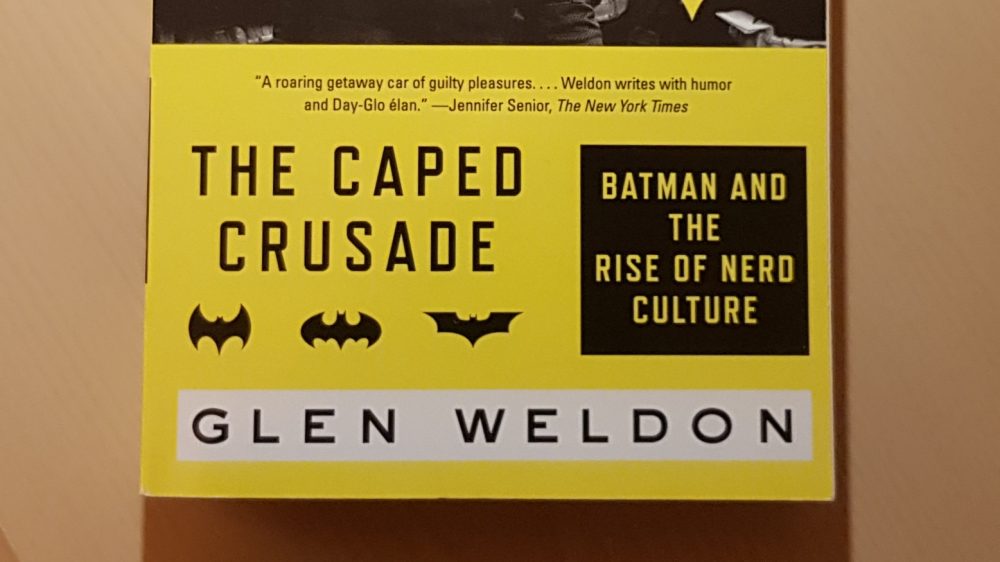
This was one of the most surprising books I read in 2016. It was a deep dive into ‘nerd culture’, and specifically the culture around the character Batman. I knew virtually nothing about Batman before I read this book, and I picked it up only reluctantly because I didn’t think I wanted to know anything about Batman.
It turned out that this was an illuminating social history about how the character has changed over the years in response to societal pressure, and how ‘nerd culture’ has developed around these superhero characters. It even became quite philosophical at points, considering the importance of authorial intent to the interpretation of characters.
It really didn’t matter that I didn’t know or care about Batman: this was just a really well-written deep dive into a topic that the author was clearly passionate about, which illuminated lots of other topics.
Essentially, this was unexpectedly brilliant.
When I read this in 2016, I gave it four out of five stars:
“Someone (I can’t remember who) recommended this book, and saying that interest in Batman was not prerequisite for enjoying it. I am the perfect test case for this: I’ve never read a Batman comic, never seen a Batman film all the way through, and only sketchily remember seeing the “Bam! Pow! Zap!” Adam West Batman series when it used to be on Saturday morning kids’ TV. Before reading this book, I would’ve sworn that Batman was able to fly.
“And I loved this book. It’s a fascinating history of how the Batman character has changed over time, and the sociocultural pressures that have caused the changes. There is a lot of discussion of how people’s own experiences colour their understanding of the character at pretty profound levels. And the whole book is infused with endearing lightheartedness, warmth and humour.
“This is also a deep exploration of how much an author’s intentions matter (or don’t matter) in creating a character. Before reading this book, I would have said with confidence that an author’s vision of a character is the “correct” interpretation of that character. Now I’m not so sure: I can see a valid argument that each reader’s interpretation is equally valid. Why can’t one audience enjoy Batman as a gay character and another audience attribute their enjoyment of the same production to his hypermasculine heterosexuality? Why limit interpretations to the artist’s intentions?
“On top of all of that, this book gives one of the most coherent and readable accounts I’ve read of the development of nerd culture, and the influence of the spread of the internet on nerd subcultures.
“I didn’t expect to make it all the way through this book – but, in fact, I raced through it and I’m raving about it. It’s great!”
2: A Very Expensive Poison by Luke Harding
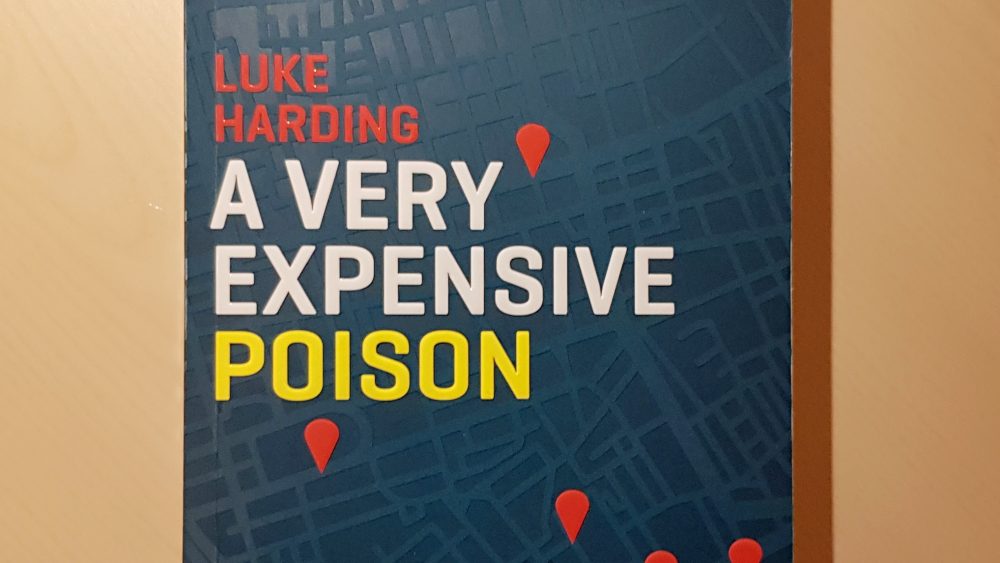
This was a brilliant book about the poisoning of Alexander Litvinenko, and the subsequent investigations into his murder. This included a detailed account of the public health response alongside the political and criminal investigations. A Very Expensive Poison was written with great precision and a driving plot, almost like a thriller. I remember being absolutely hooked.
I gave this the full five stars when I first read it:
“One of the most arresting non-fiction books I’ve ever read. A clear, detailed and compelling account of Alexander Litvinenko’s murder by the Russian state – including all of the cack-handed bungling, which only serves to humanise the story and hence make it that much more horrific. Fascinating detail on the investigation, too.”
1: When Breath Becomes Air by Paul Kalanithi
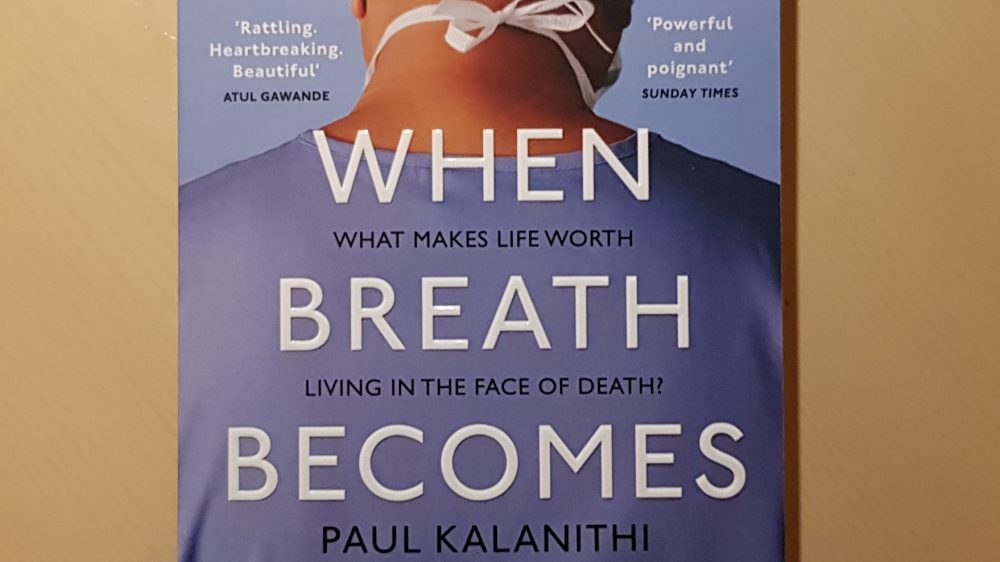
This was a deeply moving memoir by an American neurosurgeon facing his own terminal cancer diagnosis. Reading this was a deeply emotional experience, partly I think because of the quality of Kalanithi’s writing, but also partly because our broadly similar early career paths kept making me put myself in his shoes. I can still remember the intense emotion of finishing this book.
I also gave this book five stars in 2016:
“An extraordinary memoir of a doctor dying of lung cancer as he reaches the end of his specialty training, reflecting on what is important in life and death. Deeply moving.
“The similarities between Kalanithi’s life and my own made this hit close to home. The writing is brilliant – as a single example among many, Kalanithi describes someone being “found by his supervisor, covered in blood and failure” – a sensation that was so familiar I had to put the book down for a while to reflect.
“An unforgettable book which I will certainly read again.”
Reflections
I have really enjoyed this exercise of comparing what I thought when I first read these books to what I think today. I’m particularly surprised by Reputations—I can scarcely believe how negative my contemporary review was compared to how this lives in my memory.
Perhaps I’ll try and do 2017 review next year!
This post was filed under: Reviews, Anne McLean, Bill Beverly, Books, Geoff Dyer, Glen Weldon, Goodreads, Graham Norton, Ian McEwan, Juan Gabriel Vásquez, Luke Harding, Paul Kalanithi, Reading, Readwise, Robert Harris, Will Storr.